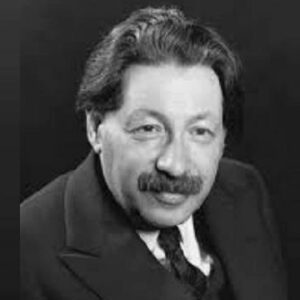Sir Ernst Boris Chain was a biochemist. In 1945, the Nobel Prize for Physiology or Medicine was given to him for his work. He won the award with Sir Alexander Fleming and Sir Howard Walter Florey, two other scientists. The three of them worked together to make penicillin, the world’s first antibiotic. It was a huge help in treating wounded soldiers during World War II. Ernst Boris Chain was interested in chemistry from a young age and got his degree in Chemistry and Physiology from Friedrich Wilhelm University. Later, he did research at the Institute of Pathology at the Charité Hospital in Berlin until Hitler’s anti-Semitic policies forced him to move to England. He did different jobs at Cambridge University, Oxford University, and the University of London. In the later part of his career, he was the Director of the International Research Centre for Chemical Microbiology at the Superior Institute of Health in Rome. Alexander Fleming had found pencillin almost ten years before he and pathologist Howard Florey worked on it. The two were able to figure out that it had antibiotic properties. Even after he retired, he kept giving lectures.
Childhood and Adolescence
Dr. Michael Chain, a scientist, and manufacturer, and his wife, Margarete Eisner, gave birth to Ernst Boris Chain on June 19, 1906, in Berlin.
He finished his schooling at Berlin’s Luisengymnasium. He would frequently visit his father’s laboratory during his school days and gained an interest in biochemistry as a result.
He earned a degree in Chemistry and Physiology from Friedrich Wilhelm University in Berlin in 1930.
Ernst Boris’s Career
He spent three years after graduating working at the Charité Hospital in Berlin. He concentrated on enzyme research during this time.
With the rise of the Nazis, he recognized that as a Jew, Germany would be unsafe for him. He moved to London, England, on April 2, 1933. He was offered a job at the University College Hospital in London after coming in England, thanks to the help of renowned scientist J.B.S. Haldane.
He got admitted as a Ph.D. student at Cambridge University’s Fitzwilliam House after only a few months. He investigated phospholipids at the university under the supervision of scientist Frederick Gowland Hopkins.
He started working at Oxford University’s Sir William Dunn School of Pathology in 1935. He was promoted to demonstrator and lecturer in chemical pathology the following year.
While working as a lecturer, he also undertook considerable research on a variety of topics, including tumor metabolism, biochemical methodologies, lysosomes, and snake venom.
In 1939, he began a rigorous study on natural antibacterial drugs produced by microorganisms with Australian pathologist and pharmacologist Howard Florey.
Following these findings, biologist Alexander Fleming’s work was revisited. Nearly a decade before, Alexander Fleming had described the penicillin mold in great detail. Penicillin’s chemical structure and medicinal properties were studied by Ernst Boris Chain and Howard Florey.
He proposed a structure for the antibiotic, which was later validated by biologist Dorothy Hodgkin using X-Ray Crystallography. In 1945, they were awarded the Nobel Prize for their work.
During World War II, penicillin was frequently employed in the military to treat infections. It was also made available to civilians after the war.
In 1948, he moved to Rome and joined the Istituto Superiore di Sanità as the Scientific Director of the Institute’s International Research Centre for Chemical Microbiology. He was a student at the institute till 1961.
He relocated to the United Kingdom in 1961 and became the Founder and Head of the Department of Biochemistry at Imperial College in London. He worked at the college until 1973 when he retired. He continued to give talks after he retired.
Studies on fermentation technology, generation of lysergic acid in submerged culture, segregation of new fungal metabolites, and the carbohydrate-amino acid interaction in nerve tissue were among his later research projects.
His Major Projects
Ernst Boris Chain was a well-known biochemist who contributed to the development of penicillin and its refinement.
In 1945, he was awarded the Nobel Prize for Physiology or Medicine, jointly with Alexander Fleming and Howard Florey.
The Swedish Medical Society awarded him the Silver Berzelius Medal in 1946. He was promoted to commander of the Legion d’Honneur the following year.
He was awarded the Paul Ehrlich Centenary Prize in 1954.
The Worshipful Society of Apothecaries of London awarded him the Gold Medal for Therapeutics in 1957.
Queen Elizabeth II knighted him in 1969.
He received honorary degrees from Bordeaux, Paris, La Plata, Cordoba, Montevideo, Turin, and Brazilian universities.
He was also a member of the New York Academy of Medicine, the Académie des Sciences in Paris, the Weizmann Institute of Science in Israel, the National Institute of Sciences in India, and the Finnish Biochemical Society, to name a few.
Personal History and Legacy
In 1948, scientist Annie Chain Benioff-Chain married Ernst Boris Chain. The couple had three children: Benjamin and Daniel, two sons, and Judith, a daughter.
He died of heart failure in Mayo General Hospital in Castlebar, Ireland, on August 12, 1979.
Estimated Net worth
Unknown.
Trivia
Ernst Boris Chain is honored at Imperial College in London with a biochemistry building.
He is also commemorated with a road in the Irish county town of Castlebar.


